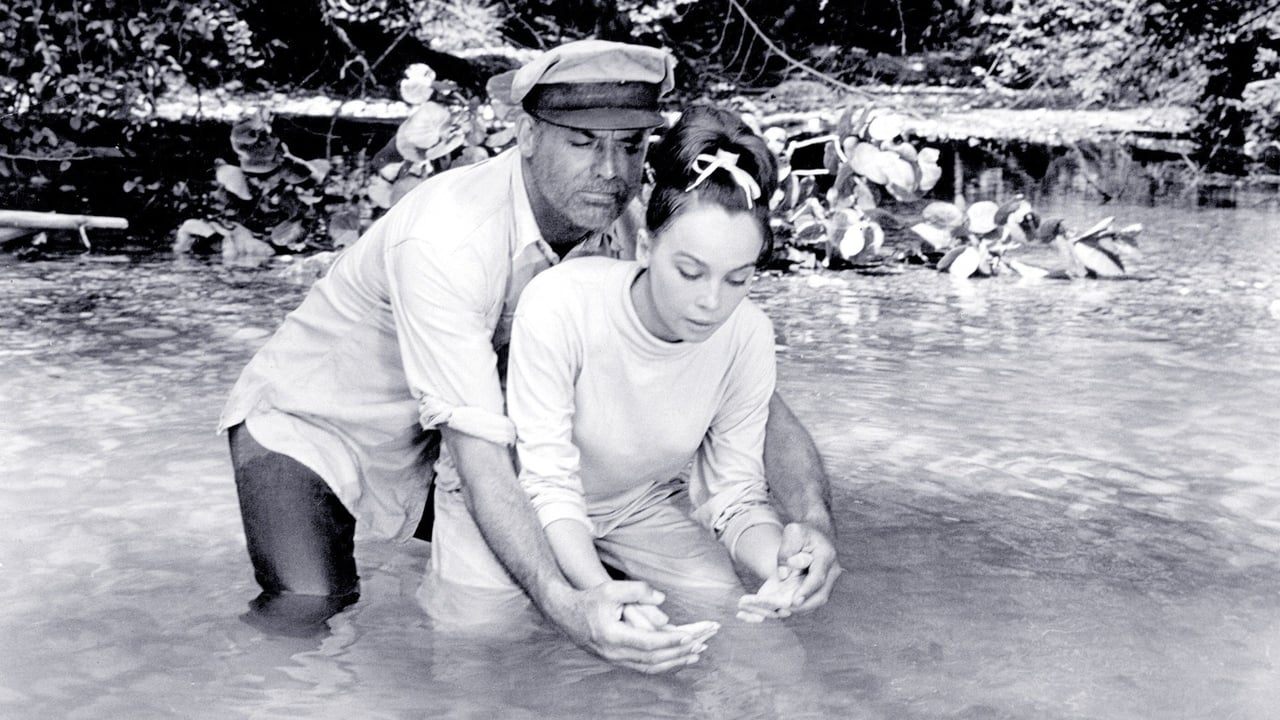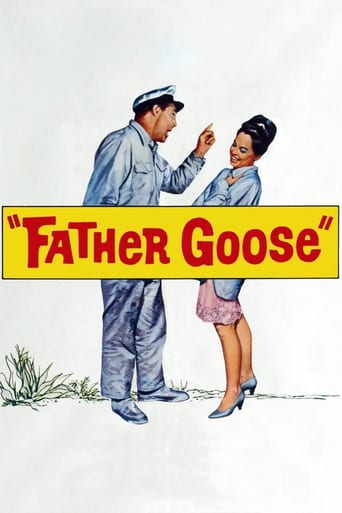

Cary Grant's effortless screen charisma was the primary selling point of a 1964 comedy called Father Goose.Grant lights up the screen as Walter, a beachcomber who lives on an isolated south seas island who has been recruited by the military to spot enemy aircraft during World War II, where he is allowed to pretty much live like a hermit and drink to his heart's content who finds his quiet existence disrupted by the arrival of a teacher (Leslie Caron) and seven young girls who have become shipwrecked on the same island as Walter.Peter Stone's screenplay, which seems to have been tailored to Grant's comic sensibilities, actually won an Academy Award, but it's not just the screenplay that works here, but the offbeat choice of character for Grant as well. Grant was always known as being suave, urbane, and sophisticated on screen, but Grant took a calculated risk here playing a character the polar opposite of his traditional on screen image...Walter is unshaven, slovenly, crude, self-absorbed, and a bit of a sexist and having such a character interacting with a straight-laced teacher and a group of young girls turned produced comic gold.Grant offers one his best performances here and his chemistry with Caron is surprisingly solid, considering the vast difference in their ages. I guess it isn't an issue here because the relationship between the two characters is more combative than romantic and Caron somehow manages to hold her own against a cinematic legend who, even though he would make his final film appearance three years later, proved that he still had the chops to carry a movie by himself, but he gets help here from an offbeat character, an unusual story, and breezy direction from Ralph Nelson.
... View MoreNo, it's not a high budget, CG intensive, action packed blockbuster. It's half a century old, contains no vulgarities or explicit scenes, no gore, very little gunfire, and only two decent explosions at the very end. (Sorry.) I do believe, however, that Father Goose is everything it was intended to be, and more. It's become a staple of regular viewing over the years in our household, to the point where bits of dialog are quoted frequently as perfect rejoinders. Even our kids say "All of them, Frank" when asked a question where a quantity or amount is the logical answer. (In more adult settings, "my coconut is empty" is more frequently employed.) For a film to work its way into the subconscious like this means the viewer has found something to cherish and commit to memory, and pull out with some glee whenever the situation warrants. Of course, this effort is wasted on those who haven't viewed the film. Fortunately, this is easily corrected.Cary Grant is the perfect reclusive curmudgeon who only wants to be left alone to pursue his dual pastimes of cruising the South Pacific and drinking. Leslie Caron is his ideal opposite, a school mistress stranded with her young charges on a remote island facing Japanese invasion. In spite of the mutual hostility, the story of them finding common ground to keep the girls safe is hilarious and heart warming, especially when framed by the harsh realities of World War II in the South Pacific.Produced at a time before filmmakers were constrained by political correctness in scripting and casting, Father Goose contains no overt or even subtle societal or political messages. In this regard, it's very refreshing to watch and enjoy. It contains enough suspense and clever dialog to keep adults engaged, and yet remains safe enough for family viewing. It's a romantic comedy that even guys and kids can enjoy, very well written and acted, and still holds up well even decades later.
... View MoreLet's see. Cary Grant plays a drunkard and ne'er-do-well. At the start of the film, we see him stealing military supplies from off the wharf. His country is fighting the Japanese in a war for survival following Pearl Harbor, but this character just wants to drink and fish--or drink like a fish.Then he meets the Leslie Caron character and the seven little girls in her charge. They all get marooned on a jungle island. Cary wants no part of the little girls and doesn't seem concerned that they have no place to sleep and no food, could wander off into the jungle and get lost, be bitten by snakes, etc. Not his problem...And by the way, he's the hero of our story.Then there's the Leslie Caron character. She takes over Cary's hut, confiscates all of his supplies, strips his boat of any usable goods....And she's the heroine.Of course, the whole point of this obnoxious behavior is that it's supposed to be funny. Certainly the Motion Picture Academy thought so. They gave the screenwriters an Oscar for best original screenplay.The 1960s were an abysmal time for the movies. Sex comedies that made wives look like broody hens. James Bond lookalikes with Playboy lifestyles that now seem like the fantasies of 12-year-old boys. On and on. Surprising how many movies of that decade are now unwatchable.
... View MoreI have lost count of how many times I have seen this movie. The first time I saw it was when I was an early teenager nearly thirty years ago with my Grandmother. (As a side note, I put a copy of this DVD in her casket when she passed away six years ago.) The movie has good clean humor, you never hear a swear word in the movie, even though you know that Walter Eckland swears like a drunk sailor, they use creative ways to get around it by innuendo as well as others.Grant's interaction with the children is great, especially with a young girl who refuses to talk, how he gets her to open up and speak is heart warming, and hilarious the way the child reacts to him.The movie is filled with humor from beginning to end, and regardless of your mood, you will always find yourself laughing at some point in the movie.
... View More